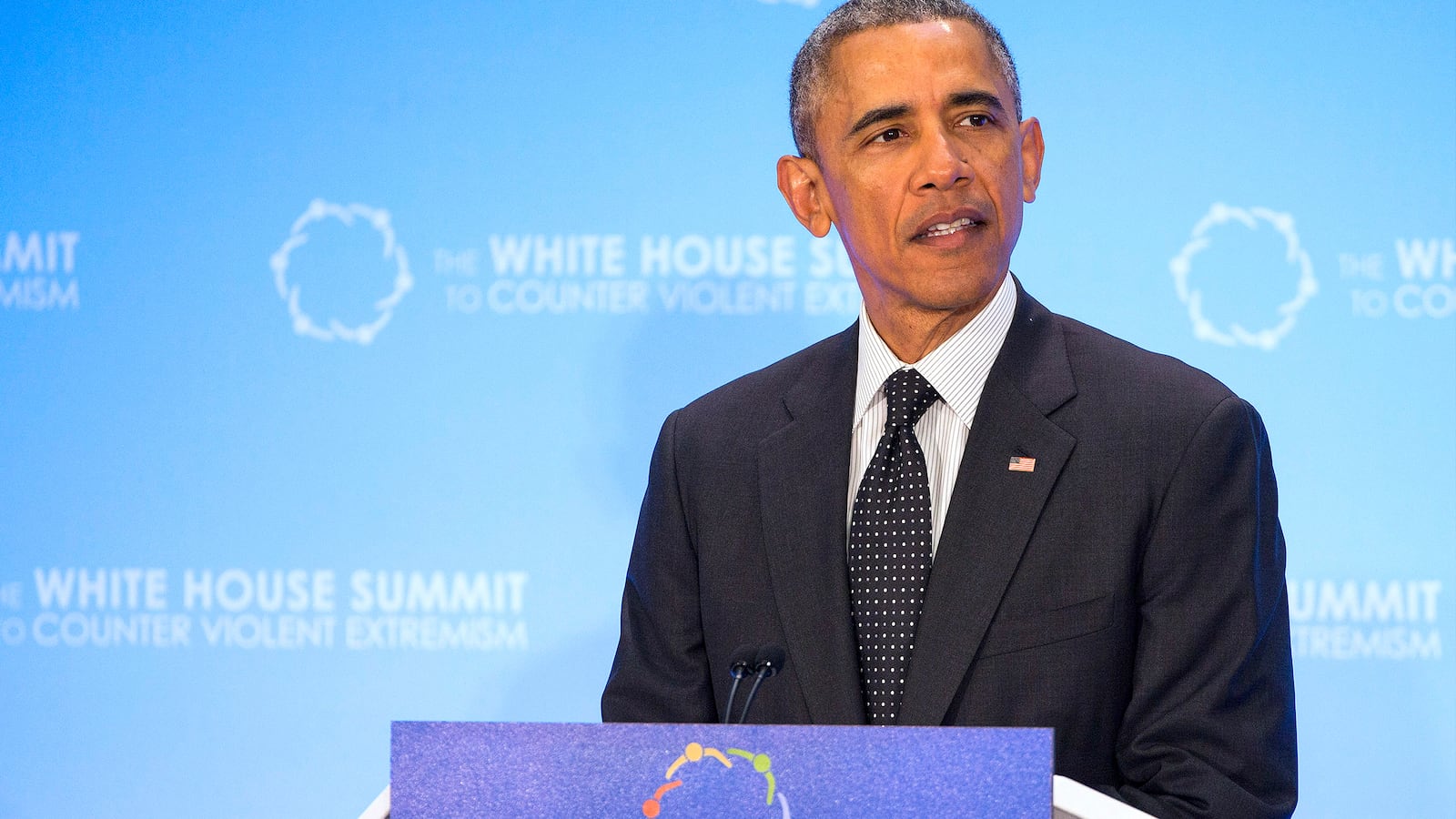If you want to help ISIS and al Qaeda, then call them Islamic. That’s one of my big takeaways from this week’s White House Summit on Countering Violent Extremism (CVE), which I attended on Wednesday.
Speakers at the CVE summit, which featured counterterrorism experts, elected officials including the Mayor of Paris, law enforcement, and Muslim leaders, offered a few reasons for this proposition. First, it’s simply inaccurate. As President Obama said as the closing speaker of the day, ISIS and al Qaeda “no more represent Islam than any madman who kills innocents in the name of God represents Christianity or Judaism or Buddhism or Hinduism.” Obama also offered a sentiment very similar to the NRA mantra: Religion doesn’t kill people, people kill people.
I understand that some will dismiss that as political correctness. Well, maybe then these reasons will move those people. As Rep. Keith Ellison (D-MN) put it at the summit, ISIS wants us to believe its actions are based in Islam because it frames the conflict as a religious war between the West and Islam. This then enables these terror groups to claim they are the defenders of Islam, thus assisting them in raising funds and attracting recruits.
But there’s another point raised subtly by some, including Obama, and more explicitly by Jordanian counterterrorism expert Suleiman Bakhit, whom I spoke to one on one, that has received little to no coverage in our media. ISIS and al Qaeda not only want people in the Muslim world to think their actions are based on Islam, but they want Westerners to as well. Why? Because they hope that people will retaliate against Muslims living in the West for al Qaeda and ISIS’ actions. If these Muslims are then subject to demonization, hate crimes or worse, the terrorists can tell Muslims: “See, the West hates Islam! That is why you should join us to fight them.”
Bakhit, who was also a participant at the CVE summit, interestingly mentioned the film The Battle of Algiers as instructive in understanding al Qaeda and ISIS. This is the second time an expert has mentioned this film in this context, the first being Rula Jabreal a few weeks ago.
For those unfamiliar with this classic 1967 film, it tells the story about Algeria’s fight for independence from France in the late 1950s and early 1960s. The Algerian National Liberation front (FLN) engaged in terrorist activities against the French. While FLN leaders knew they could not defeat the French military, they hoped that the French authorities would respond in a brutal and barbaric way against the Algerian population as a whole. Why? Because it would likely stir up more support for the independence movement by the masses of Algerians who were not part of the FLN. And that’s exactly what happened, with Algeria wining its independence a few years later.
ISIS and al Qaeda understand they can’t defeat the West militarily, but they can, with as few as two people as we saw with attack on Charlie Hebdo, increase anti-Muslim sentiment across the West. In turn the increased alienation of some in the Muslim community from mainstream society makes it easier to recruit and radicalize.
That ties into the most common theme heard at the summit, namely that the lure of ISIS and al Qaeda is to offer people on the fringes of society an opportunity to be a part of something. They use social media and peer-to-peer recruiting effectively by preying on the economically disadvantaged and marginalized, offering them self worth, similar to gangs. That, not any promises connected to the principles of Islam, was the key to ISIS and al Qaeda’s recruiting success.
Another big takeaway was that while the summit was billed as a look at all violent extremism, in reality over 90 percent of the discussion focused on Muslims. But as the ADL’s Oren Seagal explained on one panel, in last 10 years, non-Muslim terrorism has killed far more Americans. I made that very point in my article earlier this week previewing the summit.
This approach can cause an inadvertent but tangible backlash to the Muslim community as Linda Sarsour, a Muslim American leader in New York City, correctly pointed out. Sarsour told me via email that by primarily focusing on Muslims, the summit “gives the green light to local and federal law enforcement agencies to subject us to unwarranted surveillance.”
Muslims clearly want to counter terrorism and overwhelmingly want to play a role with the government in preventing radicalization of anyone from our community—even though statistically we are talking maybe 150 people who have traveled to the Middle East from the United States to join ISIS, yet that is still uncertain. But trust is the key for this relationship to work. That very point was made by law enforcement and Muslim American leaders that had joined forces in three cities—Los Angeles, Minneapolis, and Boston—as part of the federal government’s pilot program to counter radicalization.
Even President Obama noted “that engagement with communities can’t be a cover for surveillance” because “that makes it harder for us to build the trust that we need to work together.”
And Obama did his part to engender more trust with the Muslim community. He acknowledged that Muslims have been a part of the fabric of our nation since its inception and that many have served as police officers, first responders, and soldiers.
Obama also addressed anti-Muslim bigotry, mentioning the horrible murders of three Muslim American students in Chapel Hill, North Carolina, last week. And in a particularly poignant moment, the president read a Valentine’s Day card sent to him from a young Muslim girl named Sabrina, who wrote, “I enjoy being an American. But I am worried about people hating Muslims…If some Muslims do bad things, that doesn’t mean all of them do…Please tell everyone that we are good people and we’re just like everyone else.”
Will the CVE Summit yield any results in countering radicalization? Will it cause a backlash against American Muslims? Time will tell. But the one thing I’m certain is that if you want to help ISIS and al Qaeda, then by all means call them Islamic. If you want to defeat them, call them what they are: terrorists.






